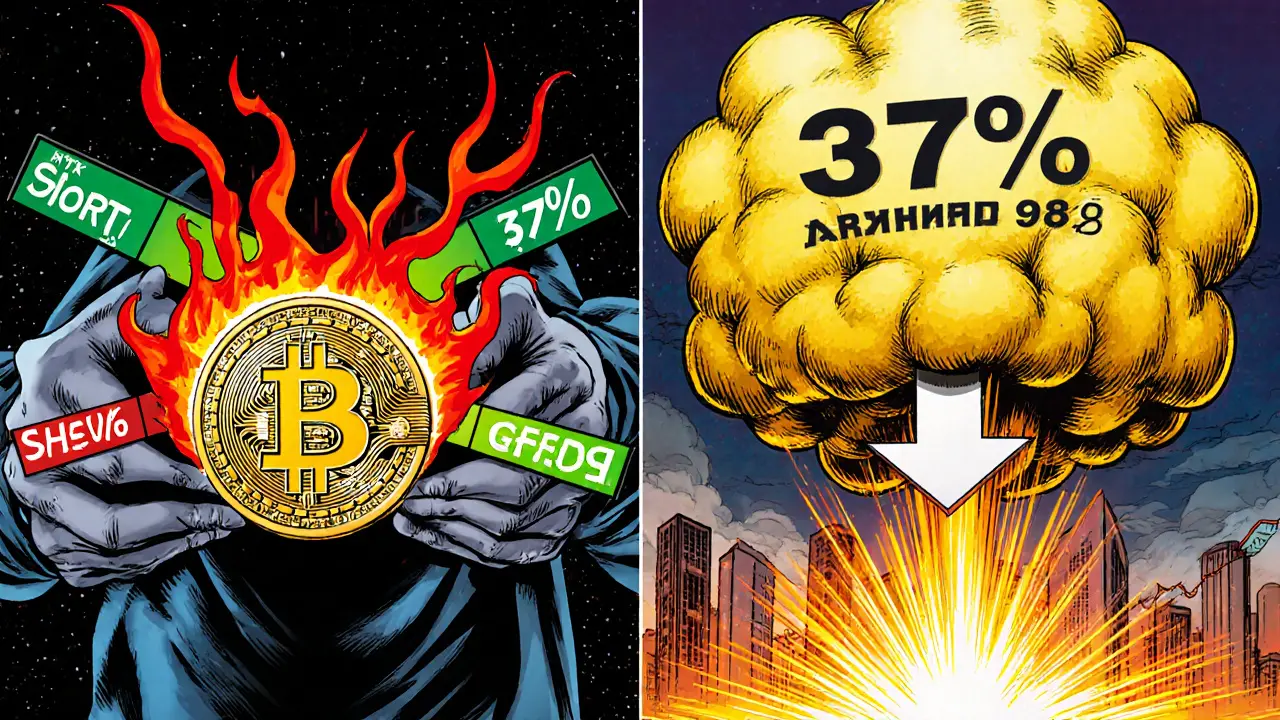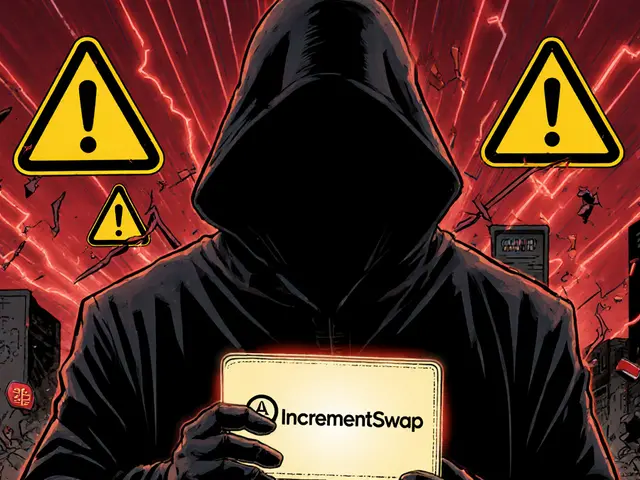Spot Trading Tax Treatment: Crypto vs Forex Rules in 2025
Crypto vs Forex Tax Calculator
Tax Comparison Tool
Calculate how your spot trading transactions would be taxed under IRS rules for crypto versus forex in 2025.
Tax Comparison Results
Taxable Gain:
Tax Rate:
Tax Liability:
Holding Period:
Long-term Gain:
Taxable Gain:
Tax Rate:
Tax Liability:
Loss Deduction Limit:
Important Note: This tool calculates based on IRS tax rules for 2025. Crypto is treated as property while forex is treated as ordinary income. Actual tax liability may vary based on individual circumstances.
For crypto: Short-term gains (held < 1 year) are taxed at your regular income tax rate (up to 37%). Long-term gains (held > 1 year) are taxed at preferential rates (0%, 15%, or 20%).
For forex: All gains are taxed as ordinary income (up to 37%) regardless of holding period. Losses can fully offset ordinary income with no $3,000 limit.
When you buy Bitcoin on Coinbase, sell it for Ethereum, then cash out to USD - you just triggered three taxable events. Most people don’t realize this until tax season hits, and suddenly they owe thousands they didn’t expect. Spot trading sounds simple: buy low, sell high. But the tax rules? They’re anything but.
Spot Trading Means Immediate Ownership - and Immediate Tax Consequences
Spot trading is when you buy or sell an asset for immediate delivery. No futures. No options. Just direct exchange. If you bought 0.5 BTC for $30,000 in January and sold it for $40,000 in June, you made a $10,000 profit. That’s taxable. And the rules change completely depending on whether you traded crypto or forex.Forex spot trading and crypto spot trading are treated like two different worlds by the IRS - and that’s where most traders get tripped up.
Cryptocurrency Spot Trading: Property, Not Currency
The IRS has been clear since 2014: crypto is property. Not money. Not currency. Property. That means every time you trade one crypto for another, sell crypto for USD, or even use crypto to buy a coffee, you’ve triggered a capital gain or loss.Here’s how it breaks down in 2025:
- Short-term gains (held less than a year): Taxed at your regular income tax rate - up to 37% for top earners.
- Long-term gains (held more than a year): Taxed at preferential rates: 0%, 15%, or 20% based on your income.
For a single filer in 2025, if your taxable income is under $47,025, you pay 0% on long-term crypto gains. That’s not a typo. If you bought Ethereum in 2020 and sold it in 2025 while staying under that income threshold, you owe nothing.
But here’s the catch: every trade counts. Selling BTC for ETH? Taxable. Swapping SOL for ADA? Taxable. Buying an NFT with USDC? Also taxable. The IRS treats each swap like a sale - you must track the cost basis of what you gave up and the fair market value of what you received.
Forex Spot Trading: Ordinary Income, No Exceptions
If you’re trading USD/EUR, GBP/JPY, or any other currency pair in the spot market, the IRS treats you differently. Under Section 988 of the tax code, all forex spot gains and losses are ordinary income or loss.No long-term rates. No 0% brackets. Just your regular income tax rate - up to 37% in 2025. Even if you held a currency position for five years, the profit is still taxed as ordinary income.
But there’s one silver lining: forex losses have no cap. Unlike crypto capital losses, which are limited to $3,000 per year against ordinary income (with the rest carried forward), forex losses can fully offset your salary, freelance income, or business profits. If you lost $15,000 on EUR/USD trades this year and made $80,000 as a software engineer, you can deduct the full $15,000.
2025’s Big Change: Form 1099-DA Is Here
Starting January 1, 2025, crypto exchanges like Coinbase, Kraken, and Binance.US must report your gross proceeds to the IRS using Form 1099-DA. This is the same way stock brokers report sales on Form 1099-B.What does that mean for you?
- If you sold $5,000 worth of Bitcoin in 2025, Coinbase sends a 1099-DA to you and the IRS showing that $5,000.
- If you traded BTC for ETH, that $5,000 trade is reported as gross proceeds - even if you didn’t cash out to USD.
Here’s the kicker: in 2025, exchanges only report the total amount you sold or exchanged. They don’t yet report your cost basis - the price you originally paid. That means you’re still responsible for tracking your own purchase history. But starting January 1, 2026, exchanges will be required to report cost basis too. That’s going to make life easier - but also harder, because the IRS will have a clearer picture of what you owe.
Important: This only applies to custodial exchanges. If you trade on decentralized platforms like Uniswap or use a hardware wallet to swap tokens yourself, you’re on your own. No 1099-DA. No paper trail. But the IRS still expects you to report it.

What About Futures? Why They’re Different
If you’re trading Bitcoin or Ethereum futures on the CME, you’re not subject to the same rules as spot trading. Futures fall under Section 1256 of the tax code. That means 60% of your gains are treated as long-term capital gains, and 40% as short-term - no matter how long you held the position.For someone in the 37% tax bracket, this can cut your tax bill by nearly 30%. On $100,000 in futures profits, you’d pay about $26,800 in taxes instead of $37,000 if it were spot crypto.
But here’s the catch: you can’t use Section 1256 for spot crypto. You can’t elect it. You can’t trick the system. If you’re buying and selling Bitcoin directly, you’re stuck with capital gains rules - and you can’t switch to the 60/40 treatment just because it’s more favorable.
Why Tracking Cost Basis Is a Nightmare
Imagine this: you bought 1 BTC in 2021 for $30,000. Then you bought another 0.5 BTC in 2022 for $45,000. In 2024, you sold 0.7 BTC for $60,000. Which coins did you sell? The first ones? The newer ones? The IRS allows you to choose your method - FIFO (first in, first out), LIFO (last in, first out), or specific identification - but you have to document it.Most people use FIFO by default. That means the first BTC you bought is the first one you sold. In this case, you’d sell 0.7 BTC from your 2021 purchase. Gain: $60,000 - $21,000 = $39,000. But if you’d used specific identification and sold the 0.5 BTC from 2022 (cost basis $45,000) plus 0.2 BTC from 2021 (cost basis $6,000), your gain would be $60,000 - $51,000 = $9,000. That’s a $30,000 difference in taxable income.
Without proper records, you’re guessing. And guessing with the IRS is a dangerous game.
Tools That Actually Help (Not Just Marketers)
There are dozens of crypto tax apps out there. Most are overpriced or overhyped. But a few actually work:- TaxBit - Best for heavy traders with 100+ transactions. Integrates with major exchanges and DeFi protocols.
- Koinly - Easy to use, great for beginners. Handles NFTs and staking too.
- CoinTracker - Strong reporting and supports international users.
These tools connect to your wallets and exchanges, pull all your transaction history, and auto-calculate gains/losses. Most charge $50-$300 per year. It’s not cheap - but it’s cheaper than an IRS audit.
Forex traders? Most use traditional accounting software like QuickBooks or hire a CPA who understands Section 988. There’s no equivalent to Koinly for forex - because the math is simpler. Just sum up your monthly profits and losses.

What You Need to Do Right Now
If you’ve done any spot trading in 2025, here’s your checklist:- Export all transaction history from every exchange and wallet you used.
- Identify which trades were crypto-to-crypto, crypto-to-fiat, or forex.
- Calculate cost basis for every crypto asset you sold or swapped.
- Use a tax tool to generate Form 8949 and Schedule D for crypto.
- For forex, total your net profit/loss and report on Form 1040 as ordinary income.
- Keep records for at least seven years - the IRS can audit crypto trades from 2021 even today.
Don’t wait until April. If you’ve traded more than $10,000 in crypto this year, you’re likely to get a 1099-DA. If you don’t report it, the IRS already knows you didn’t.
Common Mistakes (And How to Avoid Them)
- Mistake: Thinking crypto-to-crypto trades aren’t taxable. Fix: Every swap is a sale. Track it.
- Mistake: Using the exchange’s “total profit” number. Fix: That number ignores cost basis. You need your purchase prices.
- Mistake: Ignoring DeFi transactions. Fix: Swapping tokens on Uniswap? Lending on Aave? Those are taxable events too.
- Mistake: Assuming you’re exempt because you didn’t cash out. Fix: The IRS doesn’t care if you turned BTC into ETH - it cares that you sold property for something else.
What’s Next? Don’t Expect Relief
There’s no sign the IRS is going to change how crypto spot trading is taxed. Congress has floated ideas - like exempting small transactions under $200 - but nothing’s passed. The 1099-DA rollout is just the beginning. Expect more reporting requirements in 2026 and beyond.Forex traders might see changes too. Some lawmakers have proposed moving forex gains to capital gains treatment, but it’s a long shot. For now, the two systems stay separate - and the gap between them is wide.
If you’re serious about trading, treat taxes like part of your strategy. Don’t wait until April to figure it out. Build a system now. Use tools. Keep records. Know the rules. Because in spot trading, the profit you see today is the tax bill you’ll pay tomorrow.
Are crypto-to-crypto trades taxable in 2025?
Yes. Every time you trade one cryptocurrency for another - like BTC for ETH or SOL for USDC - it’s treated as a sale. You must calculate the capital gain or loss based on the fair market value of what you received and your original cost basis in what you gave up. The IRS considers this a taxable event, regardless of whether you converted to fiat.
Do I pay tax if I lost money on spot trading?
Yes, but you can deduct losses. For crypto, capital losses offset capital gains first. Then up to $3,000 against ordinary income each year. Any extra losses carry forward. For forex, losses fully offset ordinary income with no $3,000 cap - so you can deduct the full amount against your salary or business income.
What if I trade on a decentralized exchange (DEX)?
You still owe taxes. DEXs like Uniswap don’t report to the IRS, so you won’t get a 1099-DA. But the IRS still expects you to track and report every trade. If you don’t, you’re at risk of an audit. Use crypto tax software that supports wallet imports to track DEX activity.
Can I use the 60/40 tax rule for spot crypto trading?
No. The 60/40 blended tax rate under Section 1256 only applies to regulated futures contracts traded on exchanges like CME. Spot crypto trading - even if you trade daily - is always treated as capital gains or losses based on holding period. You cannot elect Section 1256 treatment for spot crypto.
What happens if I don’t report my crypto trades?
The IRS now receives 1099-DA forms from major exchanges. If you received one and didn’t report the income, you’ll likely get a notice. Penalties include 20-75% of the underpaid tax, plus interest. In severe cases, the IRS can pursue criminal charges for tax evasion. It’s not worth the risk.
How do I track cost basis for crypto bought years ago?
Start by checking your exchange history, wallet transaction logs, and bank statements for purchases. If you can’t find exact prices, use historical price data from CoinMarketCap or CoinGecko. The IRS accepts reasonable estimates if you document your method. For older trades, FIFO (first-in, first-out) is the default method unless you specify otherwise.
Do I need to report small crypto purchases under $600?
Yes. The $600 threshold applies only to reporting by exchanges on Form 1099-DA - not to your tax obligation. Even if you bought $50 of Dogecoin and sold it for $100, you owe tax on the $50 gain. The IRS requires you to report all taxable events, regardless of size.








Wait so if I swap ETH for SOL and then immediately swap it back, that’s TWO taxable events?? That’s wild. I thought only cashing out counted. 😅
This is so helpful. I’ve been ignoring my crypto trades because I thought if I didn’t touch USD, I was fine. Turns out I’ve been playing Russian roulette with the IRS. Going to export all my history tonight. Thanks for breaking this down so clearly.
so like… if i buy doge for $5 and sell for $10… i owe tax on $5??? like… fr?? i didn’t even get the money in my bank 😭
Just wanted to clarify something important: even if you use a DEX like Uniswap, you’re still responsible for reporting. No 1099 doesn’t mean no tax. The IRS doesn’t care if the exchange doesn’t report-they’ll find out eventually. Keep your records, even if it’s just a spreadsheet with dates, amounts, and prices from CoinGecko. Better safe than audited.
OH MY GOD. I DID A TRIPLE SWAP LAST YEAR-BTC → ETH → SOL → USDC-and I THOUGHT I WAS FINE BECAUSE I ENDED UP IN USD?? I JUST PAID $12K IN TAXES BECAUSE I DIDN’T KNOW EACH SWAP WAS A SALE?!?!?!?! I’M CRYING RIGHT NOW. THIS POST SAVED ME FROM A NIGHTMARE.
While the article presents a comprehensive overview, it is imperative to note that Section 988 treatment for forex is governed by U.S. federal tax law and applies uniformly to all U.S. taxpayers, regardless of trading volume. Non-resident aliens are subject to different rules; however, for U.S. residents, the ordinary income classification is non-negotiable. It is advisable to consult a licensed CPA with expertise in international tax law before engaging in cross-border forex trading.
Why do we even pay taxes on crypto trades? It’s not like the government gave me the money to buy it. They don’t even make Bitcoin. So why do I owe them? Just let people keep their gains. Taxing trades is just theft with paperwork.
Let me tell you something real: tracking cost basis isn’t a nightmare-it’s a superpower. Once you start documenting every transaction like a nerd with a spreadsheet, you stop sweating tax season. I use CoinTracker + a Google Sheet with color-coded tags: green = long-term, red = short-term, blue = DeFi. I even log gas fees as adjustments. Yeah, it’s extra work-but when you file and the IRS says ‘no notice,’ you feel like a wizard. And wizards don’t get audited.
America’s tax code is broken. Crypto should be treated like cash. Forex should be treated like stocks. But no-now we have two messy systems. And it’s all because bureaucrats can’t agree. I’m done.
They’re coming for our money. First they tax your salary, then your house, now your crypto trades. Next they’ll tax your dreams. I’m moving to Panama. Good luck, Americans.
Thank you for the detailed and accurate summary. The distinction between Section 988 and Section 1256 is critical, and many traders misunderstand this. I would recommend maintaining a digital ledger with timestamps, transaction IDs, and fair market values in USD at the time of each trade. Retain these records for at least seven years, as advised. For complex cases, professional tax advice is strongly recommended.